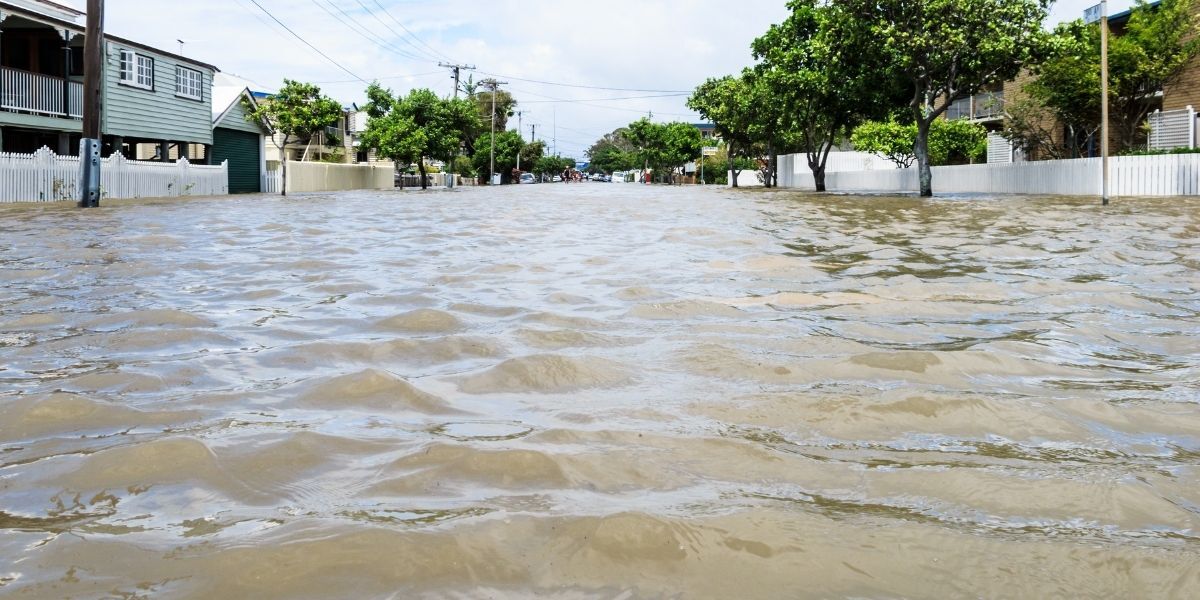After the Flood: Why Every Specifier Needs to Rethink Paving
Australia is no stranger to extreme weather. But in the past decade, floods have shifted from rare shocks to seasonal realities—swamping schools, destroying roads, and putting entire towns underwater.
And the culprit isn’t always the storm.
Sometimes, it’s the ground beneath our feet.
When Hardscapes Become Hazard Zones
In cities, the very surfaces designed for safety and access often fuel the problem. Impermeable paving—concrete, asphalt, tightly grouted stone—leaves nowhere for rainwater to go but sideways. The result? Overloaded drains, flash flooding, and preventable damage.
This isn’t a design theory—it’s fact. On multiple Australian council projects, engineers traced flood damage not to blocked pipes or poor landscaping, but to the paving itself.
That’s why specification is now climate strategy.

Image: When impermeable paving fails, stormwater has nowhere to go—leaving cracked surfaces, pooling water, and increased flood risk.
A Shift Beneath Our Streets
Progressive councils are rewriting the rules. In NSW, Queensland, and Victoria, planning codes and Water Sensitive Urban Design (WSUD) frameworks now require porous surfaces in new developments.
Resin-bound permeable paving—pioneered locally by Stoneset—has become the retrofit solution of choice, transforming failed hardscapes into functional, flood-resilient surfaces that:
- Reduce water pooling and pedestrian hazards
- Deliver compliance with WSUD standards
- Strengthen infrastructure resilience without sacrificing design
It’s function through form—by necessity.

Image: Private Driveway Resurfacing in Castle Hill NSW using two colourways.
Designing for Water: More Than Drainage
But this isn’t just about stormwater. Permeable paving plays a broader role in public health and climate adaptation:
- Flood mitigation by reducing runoff volume and pressure on stormwater networks
- Urban heat reduction by facilitating evaporative cooling at surface level
- Water quality improvement by filtering pollutants before they enter waterways
- Climate resilience by absorbing and adapting to rainfall intensity
- Regulatory compliance with evolving codes and design frameworks
As global temperatures rise and rainfall becomes more erratic, architects and specifiers are being called on to design for water—not just around it.

Photo: Permeable paving demonstration Credit: JJ Harrison
The Challenge for Today’s Specifier
Still, resistance remains. “New” materials face skepticism. Value-engineering strips sustainability at tender. And not all councils enforce permeable surface quotas consistently.
Specifiers sit in the middle: balancing durability, compliance, environmental performance, and aesthetics—often within outdated procurement frameworks. And that’s where continuing education is critical.
Beyond Product – A Specification Mindset
At Stoneset, this challenge led directly to the development of their CPD: Specifying Permeable Paving for Compliance, Climate, and Community. It’s not a product pitch. It’s a wake-up call to the risk of over-paving, under-planning, and failing to ask:
“Will this surface still work in 10 years?”
“Will it flood?” “Will it protect the people who walk on it?”
Because specification isn’t just about what a surface looks like—it’s about what it lets through, what it withstands, and what it prevents.
After the Flood, We Rebuild Smarter
Flood events will continue. But their consequences don’t have to. Through better surface specification and smarter material choices, we can prevent the next disaster before it’s paved in.
At The Arc Agency, we believe it starts at CPD. Not just with a slide deck—but with bold ideas, real-world case studies, and uncomfortable questions.
Because the future is already here. And it’s underwater.

Image: Pouring on resin-bound Gravel Binder
Join Stoneset at ArcCPD Live
Join Stoneset at ArcCPD Live to explore:
- Stormwater regulation across Australian states
- What makes a paving system truly permeable
- How surface design shapes climate-resilient communities
- Why councils are mandating change
🔗 Secure a spot at the Stoneset CPD session with ArcCPD Live
To learn more about Stoneset’s innovations in water-sensitive design and permeable paving, visit their official website.






